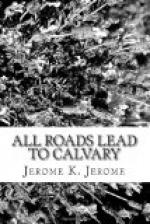These physical activities into which women were throwing themselves! Where one used one’s body as well as one’s brain—hastened to appointments; gathered round noisy tables; met fellow human beings, argued with them, walked with them, laughing and talking; forced one’s way through crowds; cheered, shouted; stood up on platforms before a sea of faces; roused applause, filling and emptying one’s lungs; met interruptions with swift flash of wit or anger, faced opposition, danger—felt one’s blood surging through one’s veins, felt one’s nerves quivering with excitement; felt the delirious thrill of passion; felt the mad joy of the loosened animal.
She threw herself into the suffrage movement. It satisfied her for a while. She had the rare gift of public speaking, and enjoyed her triumphs. She was temperate, reasonable; persuasive rather than aggressive; feeling her audience as she went, never losing touch with them. She had the magnetism that comes of sympathy. Medical students who came intending to tell her to go home and mind the baby, remained to wonder if man really was the undoubted sovereign of the world, born to look upon woman as his willing subject; to wonder whether under some unwritten whispered law it might not be the other way about. Perhaps she had the right—with or without the baby—to move about the kingdom, express her wishes for its care and management. Possibly his doubts may not have been brought about solely by the force and logic of her arguments. Possibly the voice of Nature is not altogether out of place in discussions upon Humanity’s affairs.
She wanted votes for women. But she wanted them clean—won without dishonour. These “monkey tricks”—this apish fury and impatience! Suppose it did hasten by a few months, more or less, the coming of the inevitable. Suppose, by unlawful methods, one could succeed in dragging a reform a little prematurely from the womb of time, did not one endanger the child’s health? Of what value was woman’s influence on public affairs going to be, if she was to boast that she had won the right to exercise it by unscrupulousness and brutality?
They were to be found at every corner: the reformers who could not reform themselves. The believers in universal brotherhood who hated half the people. The denouncers of tyranny demanding lamp-posts for their opponents. The bloodthirsty preachers of peace. The moralists who had persuaded themselves that every wrong was justified provided one were fighting for the right. The deaf shouters for justice. The excellent intentioned men and women labouring for reforms that could only be hoped for when greed and prejudice had yielded place to reason, and who sought to bring about their ends by appeals to passion and self-interest.
And the insincere, the self-seekers, the self-advertisers! Those who were in the business for even coarser profit! The lime-light lovers who would always say and do the clever, the unexpected thing rather than the useful and the helpful thing: to whom paradox was more than principle.




